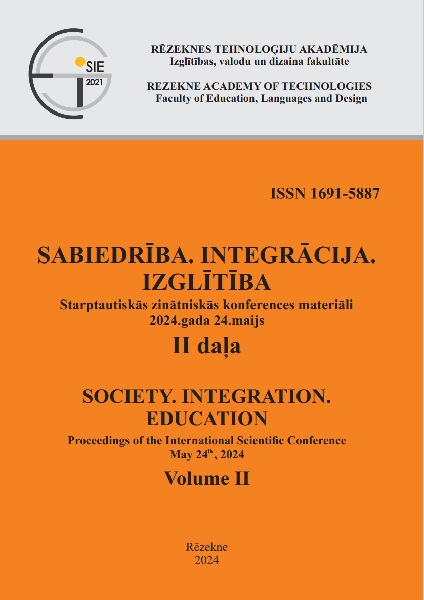MEDICAL PERSONNEL AS THE KEY TO SOCIALLY RESPONSIBLE GREEN TRANSITION IN THE HEALTHCARE SECTOR
DOI:
https://doi.org/10.17770/sie2024vol2.7821Keywords:
Education, green transition, healthcare, socially responsible, sustainabilityAbstract
To implement the socially responsible green transition in the Healthcare sector, it is essential to involve competent and educated personnel/staff. Article 48 of the Medical Treatment Law (Ārstniecības likums) of the Republic of Latvia stipulates that a medical practitioner has a duty to regularly improve his or her professional qualifications. Article 1 also defines improvement of professional qualifications as part of post-graduate education in a specific profession or specialty, which occurs in accordance with a freely selected education program, though the content and time of acquisition of which is not regulated. However, it must be noted that almost all programs offered by the Ministry of the Health of the Republic of Latvia for the improvement of practitioners’ professional qualifications refer to the acquisition of skills and knowledge necessary to improve the process of treating patients. Although various international and national regulatory acts determine the obligations of state institutions to include the green transition into their operations, the involvement of the institution’s employees is not discussed. This study aims to analyze and reflect on the competence of medical personnel and students regarding patient treatment and to analyze the compliance of the regulations of the Cabinet of Ministers with international and national regulations related to the creation of a socially responsible and sustainable state. UN Sustainable Development Goal Nr.4 “Ensure inclusive and equitable quality education and promote lifelong learning opportunities for all” includes the necessity to ensure that all trainees acquire the knowledge and skill needed to promote sustainable development, including education regarding sustainable development and sustainable lifestyle. Within the scope of the research examples of positive foreign green transition practices will be evaluated. The results obtained within the framework of the research indicate the need to develop specific guidelines for the education of medical personnel, regarding the implementation of a socially responsible green transition in the healthcare sector, ensuring quality education in terms of promoting sustainable development.
References
ANO Ģenerālā asambleja. (2015). Apvienoto Nāciju Organizācijas samita noslēguma dokumenta projekts attīstības programmas pieņemšanai laikposmam pēc 2015.gada. Pieejams: https://www.pkc.gov.lv/sites/default/files/inline-files/Dienaskartiba%202030_0.pdf
Cambridge English dictionary. (n.d.). Social Responsibility. Retrieved from: https://dictionary.cambridge.org/dictionary/english/social-responsibility
De Roeck, K. & Farooq, O. (2018). Corporate social responsibility and ethical leadership: Investigating their interactive effect on employees’ socially responsible behaviors. Journal of Business Ethics, 151(4), 923-939. DOI: https://doi.org/10.1007/s10551-017-3656-6
Dorion, E., Severo, E., Olea, P., Nodari, C., & De Guimaraes, J. F. (2012). Hospital environmental and residues management: Brazilian experiences. Journal of Environmental Assessment Policy and Management, 14(3), 1–18. Retrieved from: http://www.jstor.org/stable/enviassepolimana.14.3.05
Eiropadome & Eiropas Savienības Padome. (2023). Eiropas zaļais kurss. Pieejams: https://www.consilium.europa.eu/lv/policies/green-deal/#what
Eiropas Savienības Padome. (2022). Padomes ieteikums par mācīšanos zaļās pārkārtošanas un ilgtspējīgas attīstības sekmēšanai. Pieejams: https://eur-lex.europa.eu/legal-content/LV/TXT/PDF/?uri=CELEX:32022H0627(01)
European Commission. (N.d.). European Education Area. Retrieved from: https://education.ec.europa.eu/lv/focus-topics/green-education/about-green-education
Foundation for Environmental Education. (N.d.). Sustainability Policy. Retrieved from: https://static1.squarespace.com/static/550aa28ae4b0f34c8f787b74/t/615451869aad8c245b26784e/1632915847387/FEE+Sustainability+Policy.pdf
Latvijas Republikas Satversmes tiesas 2020.gada 10.decembra spriedums lietā Nr.2020-07-03. Pieejams: https://www.satv.tiesa.gov.lv/web/viewer.html?file=https://www.satv.tiesa.gov.lv/wp-content/uploads/2020/01/2020-07-03-Spriedums.pdf#search=
Lown Institute Hospitals Index. (2023). Lown Institute Hospitals Index for Social Responsibility 2023 Methodology. Retrieved from https://lownhospitalsindex.org/wp-content/uploads/2023/07/2023_Lown_Index_Methodology-3-1.pdf
LR Ministru kabinets. (2016). Darbības programmas "Izaugsme un nodarbinātība" 9.2.6. specifiskā atbalsta mērķa "Uzlabot ārstniecības un ārstniecības atbalsta personāla kvalifikāciju" īstenošanas noteikumi. Latvijas Vēstnesis, 220, 10.11.2016. Pieejams: https://likumi.lv/doc.php?id=286413
McCauley, P., Mathur, K., Cohen, N., Henriques_Thompson, K., Gopinath, J. & Miab, R., K. (2023). Environmental sustainability, healthcare workers and healthcare students: a literature review of attitudes and learning approaches. PREPRINT (Version 1) available at Research Square. DOI: https://doi.org/10.21203/rs.3.rs-2783033/v1
Mullan, F. (2017). Social Mission in Health Professions Education: Beyond Flexner. JAMA, 318(2), 122–123. DOI: https://doi.org/10.1001/jama.2017.7286
NHS. (2023). Climate Emergency Strategy 2020-2025. Retrieved from: https://www.newcastle-hospitals.nhs.uk/wp-content/uploads/2021/04/x228180_nuth_p1_nm.pdf
Stanford, V., Barna, S., Gupta, D. & Mortimer, F. (2023). Teaching skills for sustainable health care. The Lancet Planetary Health, 7(1), 64-67. DOI: https://doi.org/10.1016/S2542-5196(22)00330-8
Sullivan, J. K., Lowe, K. E., Gordon, I. O., Colbert, C. Y., Salas, R. N., Bernstein, A., Utech, J., Natowicz, M. R., Mehta, N., & Isaacson, J. H. (2022). Climate Change and Medical Education: An Integrative Model. Academic medicine: journal of the Association of American Medical Colleges, 97(2), 188–192. DOI: https://doi.org/10.1097/ACM.0000000000004376
Vallée, A. (2024). Green hospitals face to climate change: Between sobriety and resilience. Heliyon, 10(2). DOI: https://doi.org/10.1016/j.heliyon.2024.e24769
Veselības ministrija. (2023). Cilvēkresursu apmācības plāns. Pieejams: https://www.talakizglitiba.lv/dokumenti-un-veidlapas
Vides izglītības fonds. (B.d.). Zaļās atslēgas programmas kritēriji. Pieejams: https://zalaatslega.lv/noderiga-informacija/






